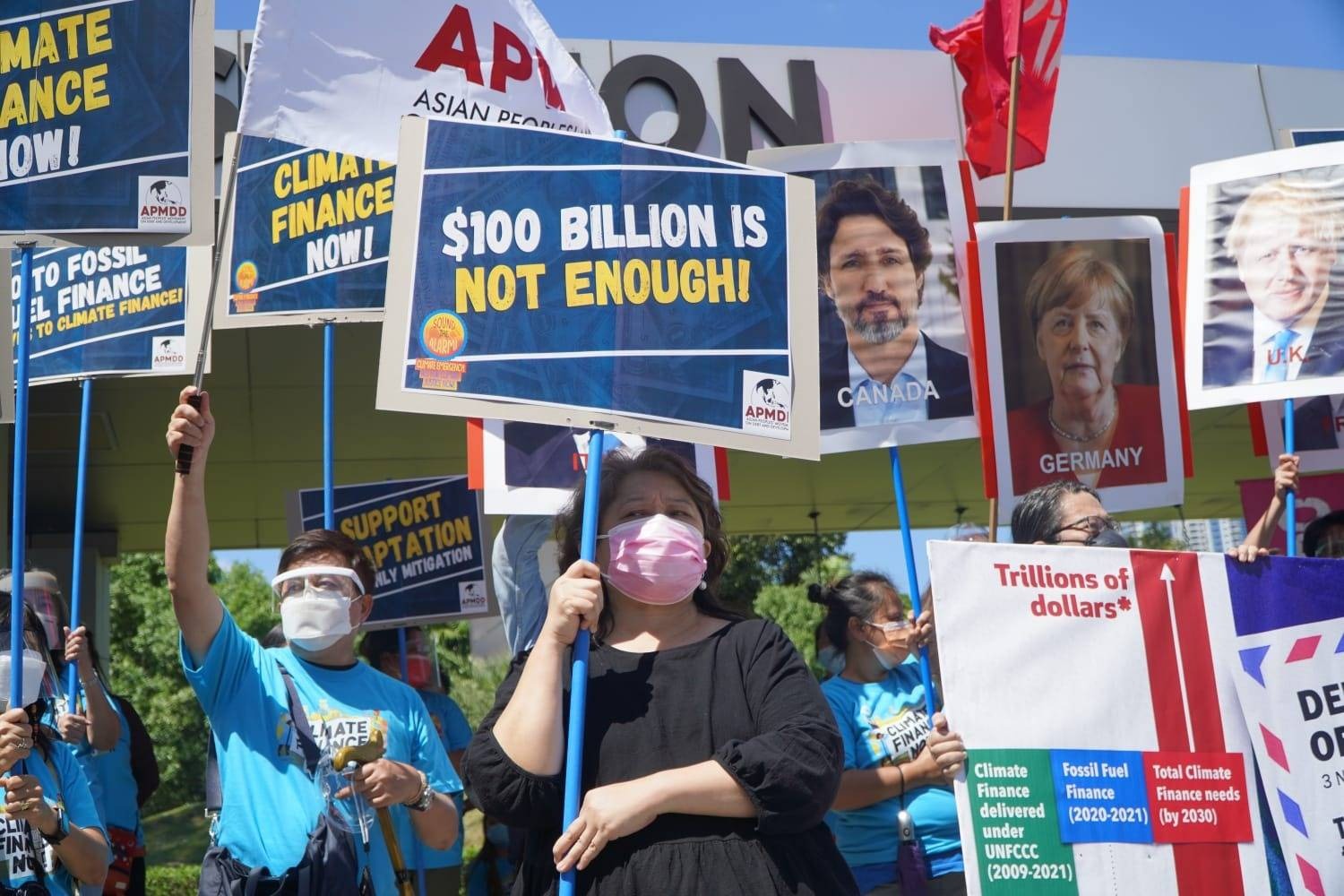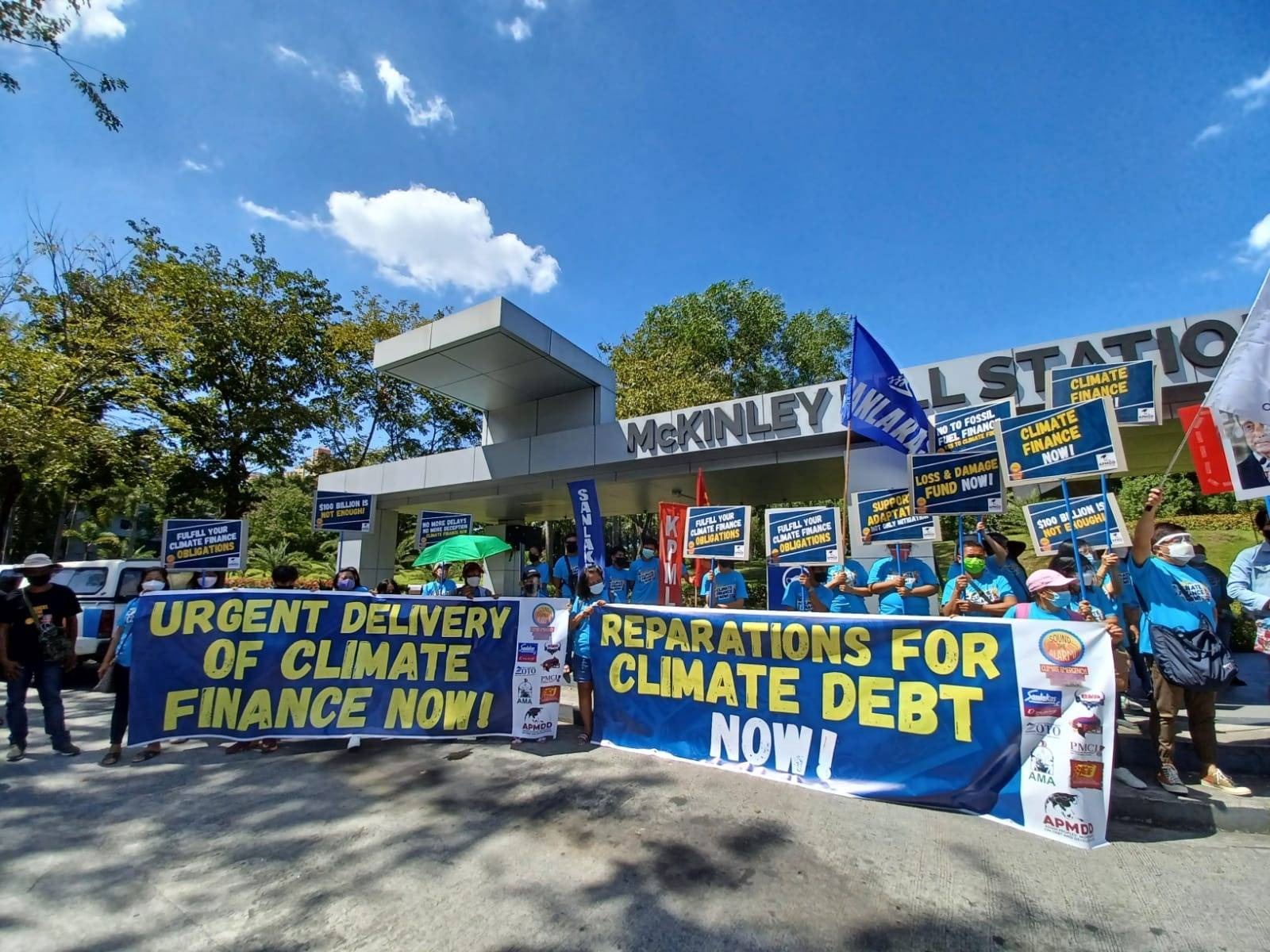

Climate campaigners from the Global South today challenged the governments of rich countries meeting at the COP26 climate summit to not only deliver fully their long-overdue climate finance pledges, but also pay their climate debt to developing countries, which far exceeds the pledged $100 billion a year in climate finance.
“It is time to pay your climate debt. You owe trillions of dollars in climate finance to the Global South. The pledged 100 billion dollars annually starting from 2020 is only a fraction of your full obligations. The scale of need and the cost of reparations for climate debt owed to the South is way more than $100 billion per year,” said Lidy Nacpil, coordinator of the Asian Peoples’ Movement on Debt and Development (APMDD), during a rally held in front of the UK Embassy in the Philippines.
Nacpil said countries with the largest share of carbon emissions should not only aim to meet the $100 billion collective pledge, but also fully deliver on their climate debt.
Nacpil said the climate finance needs of developing countries for loss and damage -- the effects of climate change which cannot be avoided or adapted to -- are predicted to run up to US$1.2 trillion per year by 2060.
Added Nacpil: “Climate finance is an obligation by most of the G20 member countries based on their huge share in historical and continuing emissions and, therefore, their responsibility for the climate crisis.”
Nacpil explained that the world’s 20 richest economies account for 80% of the world's emissions and are primarily responsible for the climate crisis.
According to the Climate Transparency Report, carbon emissions from the world’s 20 richest nations rose rapidly in 2021 due to the continued use of fossil fuels. The latest Emissions Gap Report suggests the world is on course to warm around 2.7 degrees Celsius and national plans to cut carbon emissions fall far short of what's needed to avert a climate catastrophe.
“People in the Global South are suffering the brunt of the impacts of the climate crisis. These impacts are expected to continue and worsen in the coming years. Many of the changes are irreversible. The time is now for developed countries to deliver climate finance to cover adaptation costs as well as loss and damage in developing countries. Climate finance is urgently needed now,” Nacpil said.
Nacpil said finance for loss and damage must be considered separately from adaptation and institutional mechanisms and must prioritize the most vulnerable people. In addition, climate finance should be delivered as public funds and not as private investments that expect returns or in the form of loans and other debt creating instruments.
International climate finance increased by just 2% from 2018 to 2019, leaving a $20 billion shortfall to the 2020 target, according to the latest OECD data. OECD data also shows that much of climate finance mobilized by developed countries was in the form of loans rather than grants.
Of the total climate finance mobilized from various financial mechanisms by rich, industrialized countries in 2018, 74% or $46.3 billion are in the form of loans, while only 20% are grants-based finance.
“The failure of the rich countries to deliver their US$100 billion annual target contributions to climate finance as agreed in 2009 has greatly damaged the trust of the Global South peoples and movements,” said Nacpil.
In 2009, rich countries agreed and promised to contribute US$100 billion annually by 2020 to developing countries to cover the cost of their climate change mitigation, adaptation, and loss and damage needs due to climate change impacts. Nacpil explained that the figure of $100 billion was politically derived and is nowhere near the actual climate needs of the developing world, which the UNFCCC suggests to be $6 trillion by 2030.
To date, public subsidies for fossil fuels are several times bigger than climate finance delivery. G7 governments provided at least $200 billion to support fossil fuels from 2020-2021. G20 governments and their public finance institutions are still backing fossil fuels in the amount of at least USD 63 billion per year in oil, gas, and coal projects. This was 2.5 times greater than their $26 billion a year in support for renewable energy in the same period, and several times bigger than the climate finance delivered by the developed countries among the G20.
Pledges to the Green Climate Fund, the main finance mechanism under the UN Framework Convention on Climate Change (UNFCCC), remain at a very low average of $10 billion every three years even after seven years of its full operations. Finance for adaptation has also been overlooked, with only $1 billion pledges mobilized for the Adaptation Fund in its 14 years of operations.
“What we want from COP 26 is real commitment to end public subsidies for fossil fuels and scale up new and additional, non-debt creating public finance for adaptation and loss and damage in developing countries,” said Ian Rivera of the Philippine Movement for Climate Justice.
“We challenge the rich countries to provide a clear plan and timetable for paying their climate debt. We have heard enough promises and pledges. Now is the time to deliver fully the climate financing much needed by the Global South,” said Aaron Pedrosa of SANLAKAS Philippines.




